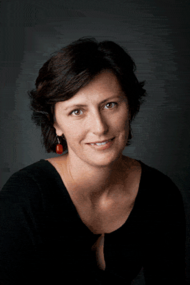Q & A with Deb Fitzpatrick

Q&A with Deb Fitzpatrick
GR Magazine
1. Where were you born, raised and schooled?
I was born in Melbourne to two English parents. In 1977, when I was five, we drove across the Nullarbor in our green Toyota Corolla to a new life in Perth, where I attended my local primary school and then Rossmoyne Senior High School. I had two or three teachers who really encouraged my interest in writing and to whom I owe serious a debt of gratitude. I was very keen to study literature so threw myself into a Bachelor of Arts degree at The University of Western Australia. Once I graduated, I worked variously as a newspaper reporter, proofreader and editor until I returned to UWA to do a Master of Arts in creative writing. Several of my university teachers were incredibly generous in sharing with me their knowledge of the craft of writing, providing crucial guidance. This was the turning point for me and allowed me to think seriously about writing for publication.
2. What did you want to be when you were 13?
Well, to actually be a writer just seemed an impossibility!, so I focused on working alongside writers – in publishing or editing. I also toyed with the idea of being a farmer’s wife.
3. What did you strongly believe at 18 that you don’t now?
I ‘knew’ that I wouldn’t meet my life partner for another ten years, in my late twenties. I somehow felt I could plan this. It was the first of many beliefs exploded.
4. What led you to your writing career?
After I’d finished my MA in creative writing, I wrote a manuscript for teenagers called Starfish. It was shortlisted for the TAG Hungerford Award in 2007, and this kicked off a very fruitful and supportive relationship with Fremantle Press. Fremantle Press published 90 packets of instant noodles in 2010, and ‘Starfish’ has since been reworked – and renamed Have you seen Ally Queen? – and is coming out in September.
5. You’ve written from the perspectives of a boy and girl now, which was more difficult and why?
To be honest, I think it was harder to write from a girl’s perspective! Which was a surprise, since presumably I have direct access to at least one girl’s experience … But in actual fact I felt less constrained when I was writing from Joel’s point of view in 90 packets because there were no ‘truths’ vying for my attention. In writing Ally, because of course I had shared some of her experiences in my own adolescence, the ‘truth’ – my truth as well as the experiences of other girls I’d grown up with – kept trying to get in the way. I also strongly felt I owed it to teenage girls to get the expression of Ally’s experiences ‘right’, while at the same time wanting to explore the idea that there being many ways to be a girl.
6. Your first book received a lot of critical acclaim – did this set a high bar for the second novel?
Yes it did, and I’m grateful, to be honest, to have been faced with that challenge. The acclaim for 90 packets was a real surprise; I had no idea how it would be received by reviewers. Of course, I’d love the same for Have you seen Ally Queen?, but it’s a different kind of story for a slightly different readership.
7. Have you thought about your next story yet?
Yes, and I’m already working on it. It’s really exciting to have a new writing project to sink my teeth into. I’m hesitant to talk about it too much yet, though, since it’s in its very early stages. I’m hoping I’ll be able to bring it to fruition.
8. What would you hope readers take away from Have You Seen Ally Queen?
I’d love readers to feel they identified in some way with Ally herself. I’d love it if they felt more confident in being themselves and not bowing to subtle and not-so-subtle pressures from wider society about how to be girls and women in what is already a difficult phase of their lives. I’d love it if they felt less anxious about falling in love, and okay about just letting it happen …
9. Which writer or writers have floored or astounded you?
Tim Winton, Helen Garner, Sonya Hartnett, Nam Le, Wendy James, Goldie Goldbloom
10. When writing, what quirky habit/s do you have?
I write at a café near my home. I need one coffee before I can get going, and then one more while I am going, and I set myself the aim of writing 500 words each day. And I take regular long walks so I can think through possible scenarios when I’m working on the early drafts of a writing project
11. What did you intentionally not do when writing your novel?
I didn’t describe in detail what the key characters look like. I love the idea that every reader will have a different mental image of how the protagonists look. I don’t want to interfere too much with that!


